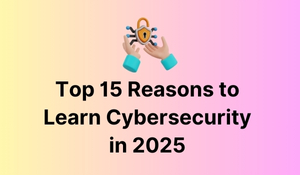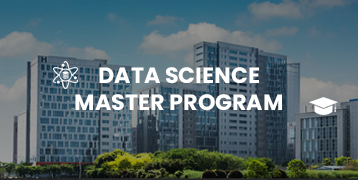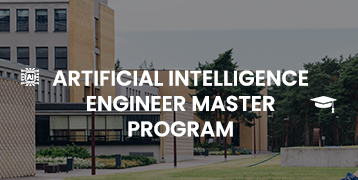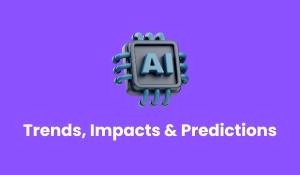
Top 15 Reasons to Learn Cybersecurity in 2025
Nowadays, so many people face cyber threats in different ways and various phases. Today, we know how we can defend against these threats and learn the importance of cybersecurity with GoLogica.
Cyber threats are numerous, and cybersecurity workers are urgently required.
In 2024, IBM indicated that the mean cost of a data breach stood at $4.88 million with a 15% increase on its last three years’ figures. This is the largest annual increase since the pandemic.
Over 57% of the organizations will spend more on securing threats. Cybersecurity is set to grow to $324 billion by the year 2025 where improvement is still the need.
What is Cybersecurity:
Cybersecurity refers to protecting computers, networks, and data from theft and damage. The more dependent we are on technology, the more important the need to protect sensitive information from hacking and malware attacks. It involves methods like firewalls and encryption to avoid attacks.
Important components of cybersecurity include risk assessment, incident response, and educating users on security. One must continue learning as methods used by cybercriminals change with technological alterations. Cybersecurity safeguards personal and organizational assets for a better digital.
Top 15 Reasons to Learn Cybersecurity in 2025
Cyber security defenses computer and network systems against cyberspace threats, including hackers, viruses, and human error. Its key aims are to make the data secure, confidential, and available to the user.
As many devices access the internet to communicate and store data, individuals, and businesses require robust defenses against cyber thieves who steal money or personal data for their self-interest.
And with great technologies, come great risks.
Cybersecurity skills are in high demand in most sectors. Here GoLogica can Provide the Top 15 Reasons to Learn Cybersecurity in 2025.
- Rising Cybercrime Rates
- Demand for Cybersecurity Professionals
- Advances in AI and Automation
- Increased Use of IoT Devices
- Cloud Security
- Ransomware Epidemic
- Growing Regulatory Requirements
- Growing Financial and Banking Sector Threats
- Securing Critical Infrastructure
- Remote Work Security
- Personal Data Protection
- Cybersecurity in Healthcare
- Increased Sophistication of Cyber Threats
- Cybersecurity as a Critical National Defense Strategy
- High-Paying Career Opportunities
Rising Cybercrime Rates:
Cybercrime has increased with technological advancement and the use of the internet, and the need for organizations and individuals to have robust security against illegal cybercriminals looking for gain in terms of money or personal success.
Cybercrime has increased because of the development of technology and internet use. Cybercriminals take advantage of the potential of money, and data, and disrupt services. Cyber threats include ransomware, phishing, data breaches, DoS/DDoS attacks, malware, and identity theft. These crimes affect different people, businesses, governments, and economies.
Reputational loss: Damage does not only result from serious losses due to cybercrime, but it also affects reputation, causes operational issues, and legal problems, and leads to social impacts. Financial losses are the most common losses arising from attacks and thefts among organizations. An identity fraud or a scam often faces individuals. Companies suffer losses through the damage to customer trust and a bad brand reputation due to data.
Demand for Cybersecurity Professionals:
Cyber attacks increase and technology becomes the major backbone in most industries. This has resulted in a high demand for security specialists. Most companies are embracing the use of digital tools, such as cloud computing and IoT that heavily rely on security.
The COVID-19 pandemic has also led to increased remote work. New cyber threats result from new technologies and compliance and cybercrime services issues. It has merely 3.5 million positions estimated in the future based on the number of cybersecurity professionals. Of course, job opportunities as well as high salaries are quite obvious in cybersecurity.
Emerging threats, technological advancement, and regulatory demands position the need for cybersecurity professionals. The jobs here offer good security, healthy salaries, and opportunities in finance, healthcare, government, and retail. The most valuable certifications are CISSP, CEH, and CCSP. A new profession that is in cloud security experts and AI-driven experts is now being unveiled.
Advances in AI and Automation:
AI and automation have enhanced business by promoting smarter, faster, and more efficient processes. They provide easy management of data and make complicated tasks relatively simple across several industries. Machine learning and deep learning are two AI technologies that enhance decision-making and pattern approval capabilities. The way to make improvements in different fields, including language processing, image recognition, fraud detection, health diagnostics, and self-driving cars.
In healthcare, AI has revolutionized the discipline of diagnostic medicine and drug discovery, and treatment is highly personalized in its application. Self-driving cars are transforming methods of transport and delivery.
AI also adds another layer of security with the confidentiality of sensitive data. In finance, fraud can be discovered and risks can be assessed to give robo-advisory recommendations.
Artificial intelligence and automation have changed the outcomes of various industries through efficiency, improving decision-making capabilities, and encouraging innovation.
They reduce the need for manual labor, making workers focus on more complex tasks, thus bringing about new jobs such as AI specialists and data scientists, and raise issues related to the loss of jobs, bias, privacy, and security.
Increased Use of IoT Devices:
The Internet of Things is a network of devices collecting online data and providing collaboration and sharing from everything that is in that network. With such a device, this technology is highly impacting and changing industries, homes, cities, and life itself with the automation of most daily routines.
The IoT forms a wonderful package for supply chain management as it establishes instant data. The emergence of 5G has made it possible to upgrade IoT as this has an increase in data speed and connectivity.
Cloud Security:
Cloud Security refers to the technology and services that protect data and applications in the cloud. This includes measures like encryption, identity access management, application security, threat detection, disaster recovery, and shared responsibility between service providers and customers. It also involves monitoring risks and compliance issues, as well as securing devices connected to them.
Ransomware Epidemic:
The global cyber threat known as the Ransomware Epidemic involves people locking data using malware and demanding money to unlock it. The low risk but high profit for attackers explains why ransomware is a major threat to business, healthcare, education, and critical infrastructure. Preventive measures include regular backups, security training, updating software, protocols, and incident response plans.
Growing Regulatory Requirements:
The advantages of wireless communication include smart devices such as smartphones, watches, and appliances that automate tasks and enhance productivity in manufacturing, smart homes, and healthcare.
Some of the primary causes of concern include data privacy, security, financial compliance, and medical standards. Companies should provide evidence that they are properly communicating with their authorities, investing in tech, and offering ongoing support.
Growing Financial and Banking Sector Threats:
The financial and banking industry faces many problems like cybersecurity threats, fraud, legal issues, and risks from new technologies. These can lead to operational issues, financial losses, legal troubles, and insider threats.
To address these risks, financial institutions should use modern technology, conduct Standard checks, collaborate with regulators and law enforcement, educate customers, and implement strong cybersecurity measures.
Securing Critical Infrastructure:
Businesses face more tasks due to globalization, technology changes, environmental concerns, social responsibility, and consumer protection.
Key issues include data privacy, security, financial compliance, and health standards. To keep up, companies must work with authorities, invest in technology, build a compliance culture, and offer ongoing training.
Remote Work Security:
Remote work requires organizations to secure data, systems, and communications from cybercriminals. Key practices include using VPNs, strong passwords, security software, system updates, and regular backups.
Personal Data Protection:
Protecting personal data is important today to maintain privacy and agree to global rules. Key principles include being clear, and responsible, limiting data collection, and obtaining permission.
Cybersecurity in Healthcare:
Healthcare cybersecurity is a significant concern due to increased technology usage such as electronic health records, telemedicine, and cloud services.
These technologies can risk for patient safety, privacy, and business operations. Complying with regulations is essential.
Increased Sophistication of Cyber Threats:
Cyber threats like APTs, ransomware, and IoT weaknesses are becoming more advanced. Organizations need to implement proactive security measures, utilize modern technology, develop incident response plans, and regularly conduct.
Cybersecurity as a Critical National Defense Strategy:
Cybersecurity is crucial for national defense in the present day. It safeguards critical systems, fights cyberterrorism, and maintains economic security.
Important components include collaboration between the public and private sectors, sharing cyber intelligence, training employees, and cooperating with others.
High-Paying Jobs:
Jobs that offer high pay include software engineer, data scientist, cybersecurity analyst, cloud engineer, healthcare worker, investment banker, engineer, and lawyer. Pursuing education, networking, interning, and looking for mentors can assist you in earning more.
Conclusion:
It will become a year of growth for the cyber world – communication, entertainment, business, and security issues. More than 3.5 million cybersecurity professionals will be job openings for people engaged in healthcare, finance, government, and technology.
Cybersecurity jobs often prefer to pay well, as starting salaries always choose to be higher than those of many professions. Salaries increase with experience and certifications, leading to six-figure sums for senior positions such as CISO.
This field gives job satisfaction when protecting personal and company information. As such, it has an incessant process of learning to keep maintaining of emerging threats. In general, it is a rewarding career with stability and growth potential. We strongly believe the content is very useful to professionals as well as learners also and we can explain the Top 15 Reasons to Learn Cybersecurity in 2025, GoLogica always be with youand will support you to achieve your goals and you will get a higher position.
















